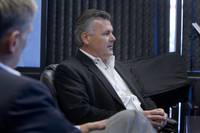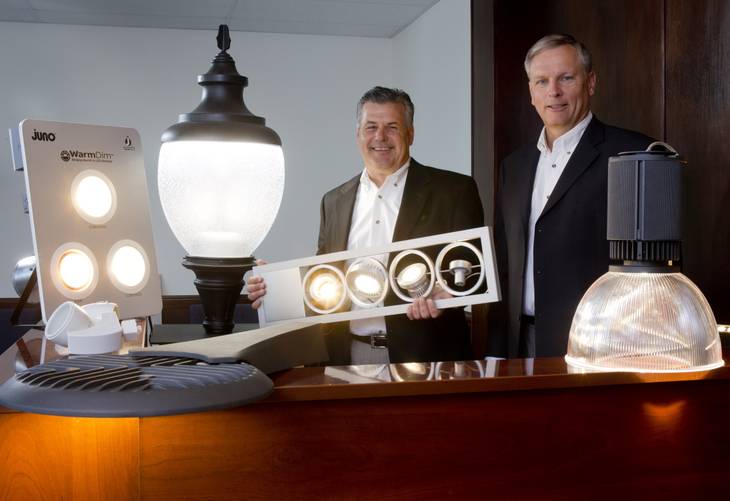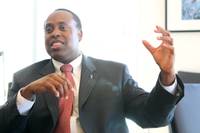Business partners Bob King and Larry Stevens took their bright idea to the bank last fall. By the time they were done, the lighting salesmen were on track to expand their 13-year-old company.
“We’ve been leasing space for the last 12 years,” said King, president and CEO of Design Concepts Inc. (known locally as DCI), a sales representative for lighting manufacturers.
“We decided that with the price of property today, the value is there to go ahead and buy a building rather than continue to lease. The opportunity presented itself.”
King and Stevens see the move as a turning point for their company, one that will help them grow. But like many small business owners who had never applied for a business loan, the process seemed daunting.
How much time will it take? What records will I need? Will my loan be approved?
Fortunately for King and Stevens, they had a clean record and their loan was approved in November.
•••
Small business lending is on the rise in Southern Nevada.
City National Bank, for example, lent $14 billion during the fourth quarter of last year, 3 percent more than in the previous quarter and 14 percent more than a year earlier. Small Business Administration lending was up 54 percent at City National last year.
“Contrary to public perception, banks want to lend,” said Bruce Ford, senior vice president of City National Bank. “When they say banks aren’t lending, that’s not accurate.”
Still, loans still have not reached pre-recession levels, said Bill Uffelman, president and CEO of the Nevada Bankers Association.
The SBA, which plays a role in most business loans, last year issued $175 million in loans statewide. That’s up from $167 million in 2011 and $103 million in 2010.
But it falls far short of the $277 million the SBA lent in Nevada in 2007.
Ford handled DCI’s loan application and offered advice to other small business owners looking to secure money.
Step one: Have a solid business plan.
“One of the questions I ask is, ‘Where do you want to get to?’” he said. “My recommendation is going to be different if the answer is ‘I want to expand my company’ instead of ‘I want to prepare the business to be sold in three years.’ Ultimately, it’s going to be their decision, but I want to be able to provide them with options.”
•••
DCI acts as the eyes and ears for approximately 70 lighting manufacturers in Southern Nevada. The company handles marketing, sales and technical support. Electrical wholesalers are the bulk of their direct customers, but they also work indirectly with developers, contractors, architects and municipalities. They typically work with design teams on the front end of a project, then help manage the bid phase.
“We see the project through from cradle to grave, from the purchase to the end of the warranty,” King said.
The company’s fingerprints are all over town. King and Stevens worked on lighting for the Cosmopolitan and M Resort and currently are working on the Hakkasan nightclub at MGM Grand. Their lights hang in the Cleveland Clinic Lou Ruvo Center for Brain Health and at UNLV’s Mendenhall Center, the basketball practice facility. A year ago, they started a project with Las Vegas to change 42,000 street lights to high-efficiency LED lights.
King, a 30-year resident of Southern Nevada, previously worked at Nevada Power, the predecessor to NV Energy. Stevens, vice president and chief operating officer of DCI, is a native Southern Nevadan who spent 18 years in electrical distribution.

DCI co-founder and CEO Bob King said his lighting company was approved for several types of loans, including a Small Business Administration loan, but opted for a conventional loan. He and his partner determined the SBA loan would cost more in the long run because of paperwork. The company borrowed more than a half million dollars.
When they started DCI, the company leased the same building King and Stevens eventually bought. Business peaked in late 2007 and early 2008, and King and Stevens hired 18 people.
Then the bottom fell out.
“We saw a freefall for three years straight,” King said. “We had to adjust from an overhead and personnel standpoint.”
The company lost 11 employees. They moved to a smaller building on Hinson Street.
“Our business is predicated on the development business,” King said. “When there are not cranes in the air on our lovely Strip corridor, our business is not nearly as good as it is when there are cranes flying. Things really slowed down. But as home builders build homes, roads have to be lighted so things gradually picked up.”
King and Stevens began contemplating buying a building in 2009. King learned that the original building the company had leased before the recession was up for sale. He inquired, and the deal was negotiated in one afternoon. DCI paid $725,000 for the facility.
“At this point, we think the economy has stabilized in Las Vegas,” King said. “It’s not robust, but stabilized, and we think it will continue to rebound at a slow pace. The interest rates are about as low as they’re going to go.”
The company moved into its new digs last week.
The 10,000-square-foot site at 4397 W. Sunset Road will give DCI room to expand and store additional inventory, King said.
•••
When Ford considers a business for a loan, he typically starts with a site visit.
He also requests three years of financial statements and, depending on the time of year, an interim statement for the current year to determine how a company is doing. City National Bank also reviews owners’ personal financial records.
Ford’s best advice: Be honest.
“Obviously, we’re looking for profitability, but we understand what has occurred in Las Vegas over the last few years,” Ford said. “Even if we see negative trends, we’ll talk about how they can be turned into positive trends.”
The biggest red flags are bankruptcy filings and bad credit reports, but they aren’t insurmountable hurdles. Ford said City National considers interaction with a loan applicant as well as financial calculations to determine whether a company is creditworthy.
•••
King and Stevens spoke with three banks before settling on City National.
DCI was looking to secure more than a half million dollars. The company qualified for several types of loans, including an SBA loan, but King and Stevens opted to take out a conventional loan. They determined it would cost more in the long run to apply for an SBA loan because of the paperwork involved.
“It was pretty much simple addition and subtraction,” King said. “The combination of the paperwork and the terms weren’t advantageous to us.”
“It’s a misnomer in the business world, especially for small businesses, that conventional loans are harder to get than an SBA loan,” he added. “We found it to be just the opposite.”
The SBA doesn’t loan money directly to borrowers. Rather, it works with lenders and guarantees 85 percent of a business loan up to $150,000.
That allows banks to consider riskier loans, which can help new entrepreneurs and companies that don’t have collateral.
Banks typically refer loans to the SBA, which has special programs for veterans, women and minorities. Successful businesspeople volunteer as mentors and provide counseling to budding entrepreneurs.
One of the key strategies they stress is drafting a business plan that outlines a company’s goals for three to five years, as well as its revenue and cash-flow projections and expenses.
Edward Cadena, the SBA’s Nevada District director, said loan agents base their decisions on three fundamental pieces of information: How much money do you need? What are you using it for? And how will you pay it back?
“Obviously, we’ve got to know whether you have good credit,” Cadena said. “For the SBA, you have to be current on any of your government debt, and that includes student loans and taxes.”
The business also has to be for profit and cannot be adult-oriented.
“Then, we find out whether or not you qualify,” Cadena said.
Cadena offered an even simpler touchstone, one that doesn’t involve banks.
“If you have a dream that doesn’t make money, that’s a hobby,” Cadena said. “If you have a dream that makes money, that’s a business. Just because I eat every day doesn’t make me a restaurateur.”
•••
Sometimes, Ford has to deliver bad news on a loan.
“I won’t ever do that with a telephone call,” Ford said. “I’ll go to the business and say, ‘Unfortunately, we weren’t able to do this loan at this time. But let me explain why so that we can get to yes next time.’”
“Ultimately, I want to leave a good taste in their mouth and showing them how to get to yes is a better response than a no,” he added.
Ford said the biggest cause for rejection is bad credit, a factor that can be mitigated if it’s discussed openly and honestly in the early stages of negotiations.
“Be honest with us, warts and all,” Ford said. “The worst thing that can happen is a negative surprise later.”

